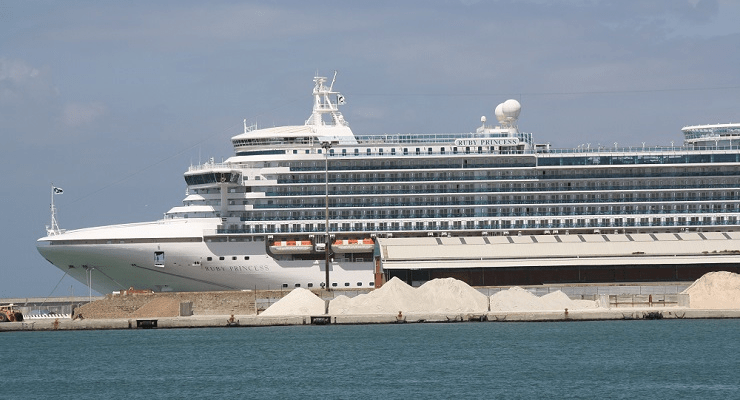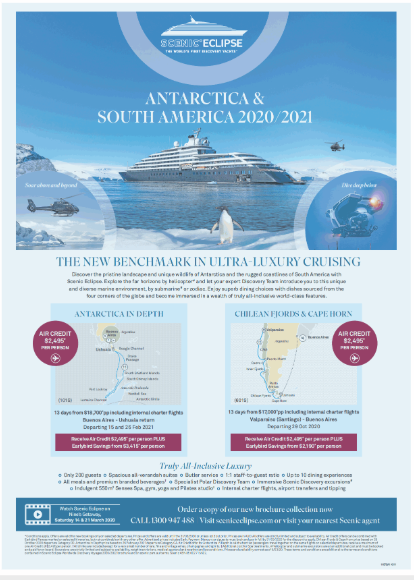
The fallout from the Ruby Princess disaster continues to haunt Australia, with a significant portion of our COVID-19 cases now connected with the cruise liner.
As several more ships circle Australian ports, governments face the challenge of what to do with passengers. COVID-19 has brought the cruise ship industry to its knees. But is that a bad thing?
The numbers
More than two weeks ago, the federal government put a 30-day ban on new cruise ships docking in Australia. But exceptions were made for those already headed to port.
One of those was the Ruby Princess, a name now synonymous with staggering incompetence and a communications breakdown between state and federal authorities that allowed hundreds of infections to spread across Australia.
As of today, over 500 passengers across Australia (including in NSW, 337 passengers plus 3 crew), had tested positive to COVID-19, accounting for more than 10% of Australia’s cases.
Cruise ships are also the source of eight of Australia’s 23 COVID-19 deaths (at the time of writing), with five coming from the Ruby Princess. Meanwhile, in Western Australia, 41 people with the virus have recently been medivaced off the Artania, a German ship docked in Fremantle — accounting for 10% of all cases in the state. There are 74 cases linked to Ovation of the Seas in NSW, 39 cases (34 passengers, 5 crew) linked to Voyager of the Seas and 11 linked to the Celebrity Solstice.
The standoff
The WA government and the crew of the Artania are at loggerheads over the ship. The state government and Australian Border Force want it gone, but the crew want to stay another two weeks.
Premier Mark McGowan is worried that letting it dock will encourage more boats. While the passengers have been evacuated, some 450 crew members remain on board.
There are reportedly 18 foreign cruise ships docked or floating in Australian waters, with 15,000 crew members still on board. Many have been docked for weeks, refusing to leave.
To break the deadlock, NSW is planning to helicopter doctors onto ships docked in the state and test more than 8000 crew members, an operation which would involve the military.
Cruise operators argue that leaving people at risk on ships is a humanitarian crisis — most are highly underpaid foreign workers, who would need to be repatriated.
It’s big business, but for how long?
Before the pandemic, there was a lot of money in cruises. In 2018, the three biggest players earned US$34 billion in revenue. Australia’s tourism industry has also banked on letting the boats in.
Two years ago, then-federal minister for tourism Steve Ciobo described Sydney as “Australia’s cruise gateway”.
“More ships means more tourists which will help drive economic growth and create new jobs,” Ciobo said.
Cruise Lines International Association Australia claims the industry contributes $3 billion in direct expenditures with a flow-on of $1.3 billion in other services, and more than 10,000 jobs.
Many newspapers also lean heavily on the industry for advertising dollars. On March 14, when cruise cancellations were starting to pick up in Australia and coronavirus deaths in Italy were already in the thousands, The Sydney Morning Herald still ran more than 12 cruise line ads, even as headlines in the paper described the country as heading toward lockdown.

Now, cruise shares have fallen up to 80% and thousands of staff have been laid off. But should we be mourning cruise liners? As The Hustle points out, the industry is built on exploitation and tax evasion. Many ships are registered in Caribbean countries like the Bahamas to minimise tax and avoid Western labour laws.
Workers, largely from south-east Asia and eastern Europe, are paid a pittance — usually between $1-2 an hour.
It’s this structural feature of the cruise industry that makes demands by Australian authorities that the ships “return home” all the more complicated.
A company like Carnival is headquartered in Miami, incorporated in Panama, and has a workforce from across the developing world. Where is home for ships and their crew?
So amid all the finger pointing about stopping the boats, it’s worth noting that it’s underpaid workers, not middle class suburban boomers, who are suffering the most; stuck on disease-ridden ships in foreign waters with no clear way of getting home.
Lethal comforts
Maybe something can be gleaned from a classic piece of writing on cruise ships: “Shipping Out” by late author David Foster Wallace, published in Harper’s Magazine in 1996.
For a week Foster Wallace took a cruise around the Caribbean. His resulting slide into what the article dubs “the (nearly lethal) comforts of a luxury cruise” is one of the great pieces of writing on the subject
“The vessel and facilities were, from what I now understand of the industry’s standards, absolutely top-hole. The food was beyond belief, the service unimpeachable, the shore excursions and shipboard activities organized for maximal stimulation down to the tiniest detail. The ship was so clean and white it looked boiled. The western Caribbean’s blue varied between baby-blanket and fluorescent; likewise the sky. Temperatures were uterine. The very sun itself seemed preset for our comfort. The crew-to-passenger ratio was 1.2 to 2. It was a Luxury Cruise.
“All of the megalines offer the same basic product-not a service or a set of services but more like a feeling: a blend of relaxation and stimulation, stressless indulgence and frantic tourism, that special mix of servility and condescension that’s marketed under configurations of the verb ‘to pamper’.
“This verb positively studs the megalines’ various brochures: ‘as you’ve never been pampered before’, ‘to-pamper yourself in our jacuzzis and saunas’; ‘Let us pamper you’, ‘Pamper yourself in the warm zephyrs of the Bahamas’. The fact that adult Americans tend to associate the word ‘pamper’ with a certain other consumer product is not an accident, I think, and the connotation is not lost on the mass-market megalines and their advertisers.”









If we think cruise ships are now a disaster waiting to happen, what about aircraft carriers? America’s fleet of carriers (are there ten?) will be impossible to operate until there is a vaccine. If we thought the Chinese were being ambiguous and / or coy about their coronavirus statistics try getting Americans to open up about the thousands of crew on each of the carrier fleets that are supposed to project American power into all corners of the globe.
Charlie, would you please stop this incessant over-tone call for a vaccine as some sort of magic panacea. The end product of this C-19 sham will be a mandatory super-vaccine. This will be the beginning of sorrows and you are falling right into it.
Thanks for the tip re ‘Shipping Out’ by David Foster Wallace. I kept a diary of a trip made in the Caribbean the year after his essay was written – & with similar conclusions.
The super-cheap foreign labour crammed into the crew quarters below was ever at the forefront of one’s thoughts. It tainted the taste of the lobster thermidor. However, I acquired the invaluable skill of fashioning a bird of paradise from a starched napkin.
Ships should have to return to countries where they are registered. This would stop the scam of being based in taxation havens as the prospect of thousands of contagious passengers ever being disgorged at their billionaires’ enclave would make governments think twice.
Send ’em back.
Oh how far has this country progressed since MV Tampa!
Australia is a wealthy country it’s taken advantage of the services provided by cheap labour on these ships (and in agriculture / backpackers). Now the bill has come home.
This is a Woody Guthrie Deportee (Plane Crash at Los Gatos) moment.
There is only one response in respect of the crew. We treat the sick and repatriate them all by air.
We bill and prosecute the domestic enablers – including their political protectors.
As to the floating incubators – well, I guess, there ours. Maybe live fire targets for the navy and new artificial reefs for divers?
Send ’em back.
Oh how far has this country progressed since MV Tampa!
Australia is a wealthy country it’s taken advantage of the services provided by cheap labour on these ships (and in agriculture / backpackers). Now the bill has come home.
This is a Woody Guthrie Deportee (Plane Crash at Los Gatos) moment.
There is only one response in respect of the crew. We treat the sick and repatriate them all by air.
We bill and prosecute the domestic enablers – including their political protectors.
As to the floating incubators – well, I guess, there ours. Maybe live fire targets for the navy and new artificial reefs for divers?
Scotty from Marketing needs to get rid of that boat on his desk- no longer fit for purpose!
How come that Julia Gillard’s rules re paying crews Australian rates of pay don’t apply to these ships as they are sailing around us for at least half the year?
Definitely creepy having these poor souls running around like slaves looking after well heeled passengers, I know heaps of people who love it however.
Scotty from Marketing has edited Tony Abbott’s ‘stop the boats’ to ‘stop certain boats’.
The carbon emissions of ocean cruises is higher than any other way of travel – over 5 tonnes CO2e for 10,000 km, which if higher than driving the same distance alone in a V8 4wd. An that doesn’t count the tours and high emission meals of red meat and other luxury foods. Ships use high emitting fuel oil and there is 50 tonnes of ship per passenger to move through the water.
The cruise industry needs to be curtailed for its grossly high level of CO2 emissions alone (even if there were no health hazards, which have been obvious for years with the number of passengers coming down with stomach buds and flu’s). The COVID infection fiasco is hopefully the beginning of the end of the industry.
Ben Rose , energy and emissions assessor.
“The carbon emissions of ocean cruises is higher than any other way of travel – over 5 tonnes CO2e for 10,000 km, which if higher than driving the same distance alone in a V8 4wd. ”
Per passenger km?
Wayne,
Yes per passenger km. There are generally 3 classes of cabin; the 5 tonne figure is for a third class cabin. First class suites occupy more than 3 times the space of an economy (4 th class) cabin, so incur 3 times the per passenger emissions.
Ben Rose
These ship owners are staying in our waters so that when more of the staff get sick they can declare an emergency and as the Tampa showed we have to take these into our hospitals because no good going home as the public health care is bugger all. Theses ship owners are just another big business lining up for a handout from this government. If the COALition Government does not charge them the full cost of care and if not paid ban them from our ports but on past record they will give these greed bastards our money and deny some of our sick proper care .
When is Albo going to stand up for us a take theses incompetent Preacher to task and prevent him from giving our country away. Is it any wonder that Hillsong are moving to the US as we will become unable to pay them as a poor workers